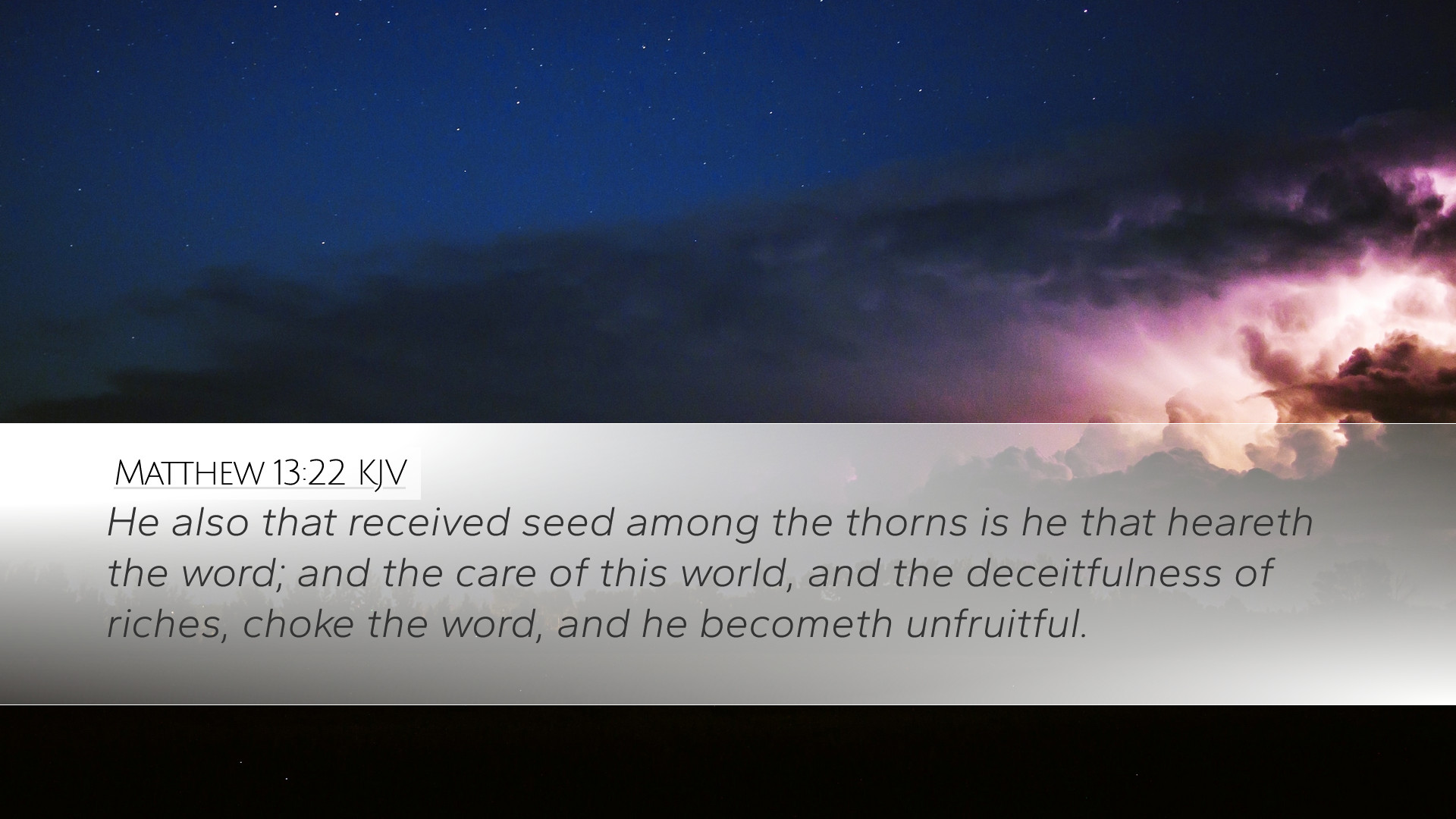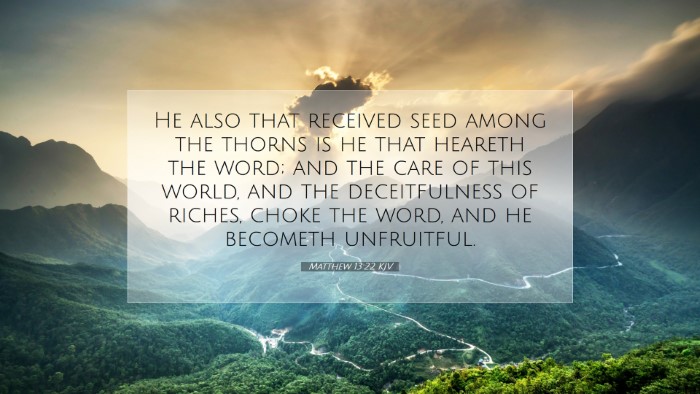Commentary on Matthew 13:22
Verse: "He also that received seed among the thorns is he that heareth the word; and the care of this world, and the deceitfulness of riches, choke the word, and he becometh unfruitful." (Matthew 13:22)
Introduction
This verse is part of the Parable of the Sower, where Jesus illustrates how different responses to the gospel yield varying results in spiritual growth and productivity. The focus here is on the seed that falls among thorns—representing the cares of life and the lure of wealth. In this commentary, insights from Matthew Henry, Albert Barnes, and Adam Clarke will provide a thorough exploration of the meaning and implications of this passage.
Interpretation of the Verse
In this parable, Jesus explores the nature of faith and the obstacles that hinder spiritual growth. The seed symbolizes the word of God, and the various grounds represent the hearts of listeners.
1. The Heart in the Parable
Henry's Insight: Matthew Henry emphasizes that the ground represents different states of the heart. Here, the thorny ground indicates a heart preoccupied with worldly concerns and material desires. This state is marked by a lack of spiritual focus, leading to a stunted growth in faith.
Barnes’ Perspective: Albert Barnes suggests that the person who receives the seed among the thorns is someone who initially responds to the gospel. However, distractions related to life’s anxieties and the deceitfulness of wealth hinder the effectiveness of the Word in their lives. This individual might be among those who desire to grow in faith yet remain ensnared by their worldly entanglements.
Clarke’s Commentary: Adam Clarke expounds on the metaphor of thorns, suggesting that the cares of life—such as worries over daily sustenance and the allure of riches—are invasive and can overshadow the initial reception of God’s Word. The thorns symbolize vanity and the pursuit of ephemeral gains.
2. Care of This World
The "care of this world" refers to the daily concerns that consume an individual’s thoughts and actions.
Henry's View: Henry asserts that excessive focus on worldly matters can lead to spiritual demise. The cares of this life can take priority over the eternal joy offered through Christ, thus leading to unfruitfulness.
Barnes on Worldly Concerns: Barnes notes that while taking care of legitimate needs is essential, it becomes problematic when these concerns dominate one’s life. This distraction ultimately becomes a barrier to spiritual growth and response to God's Word.
Clarke’s Observation: Clarke pointedly remarks on the balance required in life. Although believers partake in the affairs of life, they must resist letting these concerns choke their spiritual lives. There must be a conscious effort to prioritize spiritual realities above worldly priorities.
3. The Deceitfulness of Riches
Jesus warns about the "deceitfulness of riches," which can entice and mislead believers.
Henry's Analysis: Henry explains that the allure of wealth can promise fulfillment but ultimately leads to emptiness. There is a danger in believers mistaking material wealth for God's blessing, which could divert their attention from spiritual maturity.
Barnes' Interpretation: Barnes elaborates that wealth often leads individuals to trust in their resources rather than God. The wealth can create a false sense of security that stifles faith and dependence on divine grace.
Clarke's Thoughts: Clarke underscores the superficiality of riches; they are deceptive in that they provide temporary pleasure but fail to nurture lasting spiritual growth. He warns that an overvaluation of material success can lead the heart away from Christ.
Consequences of Unfruitfulness
This verse concludes with a sobering note regarding the outcome of neglecting spiritual responsibilities.
Henry’s Warning: Matthew Henry cautions that the individual who allows thorns to choke out the Word ultimately becomes unfruitful, missing the divine potential for their life. This unfruitfulness manifests as a lack of spiritual growth, impacting both the individual and the community.
Barnes on Unfruitfulness: Barnes comments that being unfruitful signifies a failure to demonstrate the necessary evidence of a genuine faith experience. The lack of fruit is a clear indication of a heart that has not fully embraced the gospel.
Clarke’s Reflection: Clarke reflects on the seriousness of being unfruitful. He argues that a lack of spiritual fruit is not merely a personal loss but affects the wider body of Christ. Unfruitfulness leads to a stagnant faith that can influence others negatively.
Practical Applications
Pastors, theologians, and students must glean from this commentary insights applicable to contemporary Christians facing similar challenges.
- Prioritize Spiritual Growth: Believers should assess their lives, ensuring that the cares of this world do not overshadow their relationship with God.
- Beware of Material Temptations: Recognize the intoxicating nature of riches and possessions, fostering a spirit of contentment and reliance on God rather than wealth.
- Encourage Accountability: Create environments where believers can discuss their struggles with worldly distractions, fostering encouragement that focuses on spiritual outcomes.
- Seek First the Kingdom: Cultivate a priority of seeking the Kingdom of God above material pursuits, ensuring a life that bears good fruit for the Gospel.
Conclusion
Matthew 13:22 offers timeless wisdom concerning the distractions that can hinder our spiritual journey. By understanding the implications of worldly cares and the deceitfulness of riches, believers are encouraged to cultivate a heart that remains responsive to God's Word. Through the insights of Henry, Barnes, and Clarke, we are reminded of the earnest need to reflect on our priorities, ensuring that we bear fruit for the Kingdom and glorify God in all that we do.


